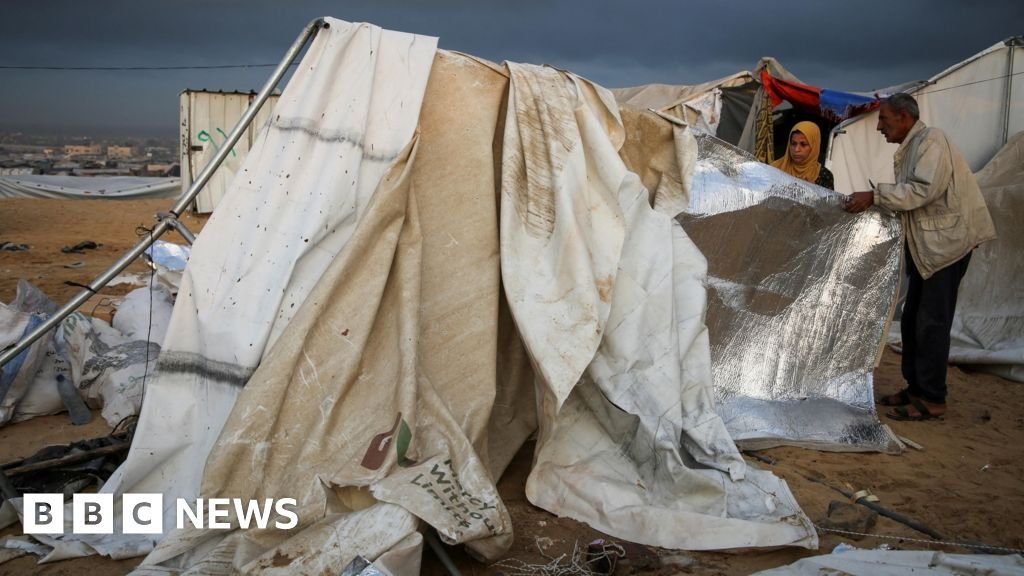The US is by far Israel’s largest arms supplier, and the Israeli military has relied heavily on US-supplied aircraft, guided bombs, rockets and projectiles in the war against Hamas in Gaza over the past year.
The US letter to the Israeli government, the contents of which have now been confirmed by the State Department, was first reported by Axios. It was signed by Secretary of State Anthony Blinken and Defense Secretary Lloyd Austin.
“We are writing to underscore the US government’s deep concern about the deteriorating humanitarian situation in Gaza, and urge your government to take urgent and sustained action this month to reverse this trajectory,” it said.
It said that Israeli evacuation orders had forced 1.7 million people into the narrow coastal area of Al-Mawasi, where they are at “high risk of fatal infection” due to extreme overcrowding, and that humanitarian organizations report that their survival needs cannot be satisfied.
“We are particularly concerned about recent actions by the Israeli government, including the suspension of commercial imports, the denial or obstruction of nearly 90% of humanitarian movements between north and south Gaza in September, the maintenance of onerous and excessive dual-use restrictions, and the introduction of new vetting and burdensome liability and customs demands for humanitarian personnel and cargo – along with increased lawlessness and looting – are contributing to the accelerated deterioration of conditions in Gaza,” the report added.
The letter said Israel “must, starting now and within 30 days” take a number of concrete steps to increase aid supplies, adding that failure could “have consequences for US policy”.
It cites US laws that can bar military aid to countries that obstruct the delivery of US humanitarian aid.
It said Israel should “increase all forms of humanitarian aid throughout Gaza” before winter, including allowing at least 350 trucks a day to pass through all four main crossings and a new fifth crossing, and allowing people in al-Mawasi to move inland countries.
He also called on Israel to end the “isolation of northern Gaza”, affirming that there would be “no policy of the Israeli government to forcibly evacuate the civilian population” from the north to the south.
At a press conference in Washington on Tuesday, US State Department spokesman Matthew Miller told reporters that the letter was “a private diplomatic message that we were not going to make public.”
“Minister (Blinken) along with Minister Austin thought it would be appropriate to make it clear to the Israeli government that they need to make changes again so that the level of aid that is being provided to Gaza is restored,” he said.
Mr. Miller declined to speculate on what the consequences might be for Israel if it does not increase access to humanitarian aid.
But he noted: “Recipients of American military aid do not arbitrarily refuse or obstruct the delivery of American humanitarian aid. It’s just the law, and of course we’ll follow the law. But we hope Israel will make the changes we have outlined. “
He also said the 30-day limit was unrelated to the November 5 US presidential election, saying it was “appropriate to give them time to work through the various issues”.
Israel has previously insisted there are no limits on the amount of aid or humanitarian aid that can be delivered to and through Gaza, and blames UN agencies for failing to distribute supplies. He also accuses Hamas of stealing aid, which the group denies.
Before Israel’s ground offensive on the southern Gaza city of Rafah in May, President Joe Biden first suspended the shipment of one batch of 2,000- and 500-pound bombs in an attempt to dissuade him from a full-scale attack.
But the president immediately faced backlash from Republicans in Washington and from Israeli Prime Minister Benjamin Netanyahu, who appeared to liken it to an “arms embargo.” The suspension was partially lifted in July and has not been repeated.

